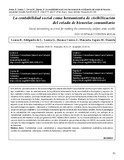Mostrar el registro sencillo del ítem
La contabilidad social como herramienta de visibilización del estado de bienestar comunitario
| dc.rights.license | http://creativecommons.org/licenses/by-nc-sa/3.0/ve/ | es_VE |
| dc.contributor.author | Loaiza B., Edilgardo de J | |
| dc.contributor.author | Loaiza G., Jhoana | |
| dc.contributor.author | Correa Z., Manuela | |
| dc.contributor.author | Zapata M., Daniela | |
| dc.date.accessioned | 2024-12-06T16:25:22Z | |
| dc.date.available | 2024-12-06T16:25:22Z | |
| dc.date.issued | 2024-12-06 | |
| dc.identifier.uri | http://www.saber.ula.ve/handle/123456789/51219 | |
| dc.description.abstract | Este artículo, presenta avances de una investigación enmarcada dentro la modalidad mixta ya que reúne aspectos de tipo cuantitativo como la caracterización de la población intervenida desde una estadística descriptiva y aspectos de tipo cualitativo debido a que se utilizarán indicadores de tipo social y de bienestar que forman parte de la percepción subjetiva de las madres, personas beneficiadas de los servicios que presta la Fundación Alianza Sin Fronteras, la cual se ubica en el municipio de Bello, departamento de Antioquia en Colombia. Mediante la técnica de triangulación, se tomó la información recolectada, y se buscó articulaciones y coincidencias de la misma que permita comprender el impacto social de la labor realizada por la ONG en el área de influencia. Como propósito de la investigación se diseñó una metodología de registro, valoración y visibilización de indicadores contables desde una perspectiva financiera y social con enfoque cualitativo. Los resultados brindaron aportes al desarrollo de la teoría contable, desde el paradigma de la contabilidad del comportamiento humano, apoyada en conceptos de contabilidad social y con enfoque en la contabilidad cualitativa. Su importancia radica en que por tratarse del diseño de una metodología de valoración y visibilización del beneficio social que genera la ONG “Alianza Sin Fronteras” en su zona de influencia, no solo permite conocer desde la contabilidad y los indicadores sociales, el beneficio que prestan este tipo de ONGS, sino medir desde el concepto de valor intangible, cual es el desarrollo de la calidad de vida de la comunidad intervenida desde indicadores de bienestar | es_VE |
| dc.language.iso | es | es_VE |
| dc.publisher | Saber-ULA | es_VE |
| dc.rights | info:eu-repo/semantics/openAccess | es_VE |
| dc.subject | Contabilidad social | es_VE |
| dc.subject | contabilidad y comportamiento humano | es_VE |
| dc.subject | contabilidad cualitativa | es_VE |
| dc.subject | indicadores | es_VE |
| dc.subject | sociales de contabilidad | es_VE |
| dc.subject | valoración contable de bienestar | es_VE |
| dc.subject | calidad de vida | es_VE |
| dc.title | La contabilidad social como herramienta de visibilización del estado de bienestar comunitario | es_VE |
| dc.title.alternative | Social accounting as a tool for making the community welfare state visible | es_VE |
| dc.type | info:eu-repo/semantics/article | es_VE |
| dc.description.abstract1 | This article presents advances of a research framed within the mixed modality since it brings together quantitative aspects such as the characterization of the intervened population from a descriptive statistic and qualitative aspects because of the use of social and well-being indicators that are part of the subjective perception of the mothers, people benefited from the services provided by the Alliance Without Borders Foundation, which is located in the municipality of Bello, department of Antioquia in Colombia. Through the triangulation technique, information was collected, and articulations and coincidences were sought to understand the social impact of the work carried out by the NGO in the area of influence. The purpose of the research was to design a methodology for recording, valuing and making accounting indicators visible from a financial and social perspective through a qualitative approach. The results provided contributions to the development of accounting theory, from the perception of accounting of human behavior, based on concepts of social accounting and with a focus on qualitative accounting. Its importance lies in the fact that because it is the design of a methodology for valuing and making visible the social benefit generated by the NGO "Alianza Sin Fronteras" in its area of influence, it not only allows us to know from accounting and social indicators, the benefit provided by this type of NGO, but also to measure from the concept of intangible value which is the improvement of the quality of life of the intervened community from well-being indicators | es_VE |
| dc.description.colacion | 82-120 | es_VE |
| dc.description.email | eloaiza@elpoli.edu.co | es_VE |
| dc.description.email | jhoana_loaiza90172@elpoli.edu.co | es_VE |
| dc.description.email | manuela_correa90172@elpoli.edu.co | es_VE |
| dc.description.email | daniela_zapata90172@elpoli.edu.co | es_VE |
| dc.publisher.pais | Venezuela | es_VE |
| dc.subject.institucion | Universidad de Los Andes | es_VE |
| dc.subject.keywords | Social accounting | es_VE |
| dc.subject.keywords | accounting and human behavior | es_VE |
| dc.subject.keywords | qualitative accounting | es_VE |
| dc.subject.keywords | social accounting indicators | es_VE |
| dc.subject.keywords | accounting valuation of well-being | es_VE |
| dc.subject.keywords | quality of life | es_VE |
| dc.subject.tipo | Revistas | es_VE |
| dc.type.media | Texto | es_VE |
| dc.identifier.doi | https://doi.org/10.53766/ACCON/2024.48.01.04 | es |
Ficheros en el ítem
Este ítem aparece en la(s) siguiente(s) colección(ones)
-
Actualidad Contable FACES - Año 027 - Nº 048
Enero-Junio 2024


